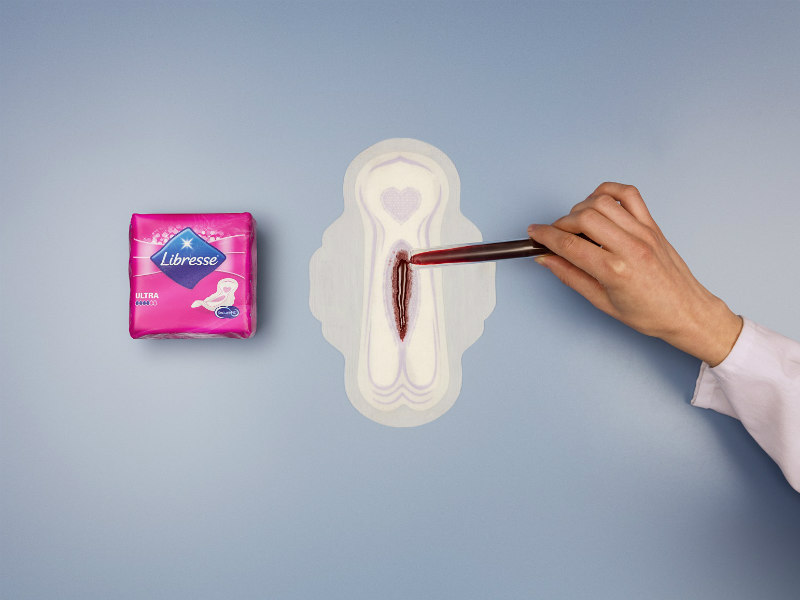Madhavi Tumkur 10 Mar 2021 // 9:27AM GMT

Scene: Campaign planning for a pain medicine.
Male strategist: Well, pain doesn’t have a set pattern so campaigns can't be planned like it is for flu.
Female colleague: Have you spoken to a girl yet? We experience pain each month; it’s like clockwork.
This account of an actual agency conversation reinforces how men can be totally oblivious to the menstrual pain women face each month. At another campaign planning meeting, teams discussing sanitary pads skirted embarrassingly around problems relating to leakage, chafing, absorbency and comfort.
It is perhaps because of such embarrassment and tiptoeing around period stigmas, we continue to view farcical ads about women feeling energised and empowered just by wearing a pad and going about their day with a smile on their face. That is hardly the case. Menstrual pain, discomfort, body ache, lethargy, even nausea, are all commonly suffered — but this is rarely reflected in marketing communication.
Menstruation is now a political, social, economic, gender and educational issue which has garnered widespread attention not just at a national level, but also from NGOs and educational institutions across the globe.
The PR industry should pay close attention to the groundswell of support that women's health issues are receiving. Especially in Asia, it has the opportunity to play a leadership role in helping to alleviate the social stigma associated with periods. Similarly, the public affairs industry can further help by lobbying governments to remove tampon taxes and mandating feminine hygiene education in schools, in the same way sexual education has been incorporated.
Period poverty: A political issue
"Tampons are taxed; Viagra isn’t." These famous words by Hollywood actress Ashley Judd roused a heated debate among US lawmakers on how prescription medicines like Viagra are exempt from taxation while pads are categorised under grooming products like soaps and are subject to tax.
Judd joined millions of campaigners, activists, feminists, community leaders, media personalities and heads of countries who are actively lobbying to reduce 'period poverty' by providing access to pads or tampons, enabling women to maintain good menstrual hygiene and helping them manage periods with dignity.
In India, Bollywood superstar Akshay Kumar played the 'Pad Man', representing social entrepreneur Arunachalam Muruganantham who not only invented low-cost sanitary napkins but also generated awareness about the religious and cultural stigmas that surround menstruation. The film fuelled years of campaigning and led the Indian government to remove the 12% duty on menstrual products in 2018.
Britain abolished VAT on pads earlier this year while Scotland became the first country to make feminine hygiene products freely available to all. New Zealand followed suit and announced the same in February 2021.
Unfortunately, a tampon tax is still levied on feminine hygiene products across a number of Asian countries, including Vietnam, Indonesia, the Philippines, Thailand, Japan, China, Hong Kong, Bhutan and Sri Lanka.
Pink tax: A regulatory issue
“Why can’t Singapore follow New Zealand’s example and also make pads freely available?” asks Uma Rudd Chia, former Weber Shandwick creative director who is co-founder and ECD at boutique ad agency KVUR. “We have such a wide distribution of vending machines here. Why can’t these machines dispense pads too?” Currently Singapore levies a standard 7% GST on sanitary products. Rudd Chia points out that for many Singaporeans, this may still be unaffordable.
Jonathan Sanchez, head of corporate affairs at Diageo, makes a more brazen point: “If men had periods, I am sure there would be no tax on tampons – and they’d be in every toilet, everywhere.
“I want to see period products in men’s toilets in the office. Imagine the message a male colleague offering to get a female friend a tampon would send? It is really not a question of educating men about women’s bodies, men know what periods are — education is no excuse, lack of care however is,” believes Sanchez.
Indeed, for many women, the debate on menstrual health goes beyond tampon taxes. They are not necessarily comfortable talking about it and require more sensitivity, particularly from patriarchal systems.
To Rahat Kapur, a body positive influencer working in the PR industry in Singapore, dealing with dignity means not having to talk about it. “For me, true equality and understanding comes from me not having to explain to my colleagues that I may be menstruating, and that it can be any other day off without having to see a doctor or producing a medical certificate,” she says. Women, she adds, still get labelled for behaving in a certain way because it is “that time of the month”, while men are rarely censured for exhibiting similar behaviour.
Period stigma is currently one of the biggest unspoken workplace barriers for women. Sanitary pads company Libra, sought to normalise period conversations through its #bloodnormal campaign in 2019 by depicting red ink on pads in Australia. The television ad received more than 600 complaints from viewers who found it “disdainful”, “extremely offensive” and “vulgar”. Such complaints show that we as a society have a long way to go in destigmatising periods.
Period conversations: A PR issue
Not since the Vagina Monologues have I seen a rise in collective voice about normalising conversations around women’s issues. This should matter to the PR industry, which is tasked with building authenticity in its communications messages and address feminine hygiene with empathy. In Asia, cultural stigmas are especially problematic, while large sections of the societies still have no access to period products.
Unfortunately, the current state of marketing communications suggests that very few agencies in Asia are taking this seriously — with messaging in relevant campaigns continuing to strike an archaic tone.
“Until last year, I thought all periods were blue,” remarks Sanchez in jest. “We need to show blood in its natural form as a part of empowered adulthood. We need to start period awareness that will normalise the normal, whether it is supermarkets removing the horrid insinuation that periods are unhygienic or blood being shown on period products and clothes in communications.”
Chinese communications giant Blue Focus is one agency that led a fine example for Libresse through its “Liberating Our Periods” campaign, which aimed to turn a taboo topic into a symbol of feminine power. The campaign ranked sixth at last year's Global SABRE Awards, building “period pride” by imagining a more inclusive and accepting world where women can talk about menstruation openly. In the process, the campaign destigmatised period-related conversations and helped improve understanding of what women experience each month.
The campaign follows a taboo-smashing #BloodNormal campaign run by Bodyform titled: 'Periods are normal, showing them should be too'. Adopting a multi-pronged approach, Bodyform depicted normal period blood on a pad, normal period pains, men buying pads and even period sex.
Bodyform also partnered with French Fashion House, Dessu to produce "designer period underwear" with red embroidery patterns on white to mimic leakage, pad shaped lie lows and engaged a 12-year old student comedienne who celebrated the onset of periods as a mark of not being pregnant. Created by BBDO and supported by Ketchum, the campaign killed shame with empathy.
Last year, Bodyform took conversations about women's bodies to an all new level through their film: Womb Stories. The film from Golden Globe-winning director Nisha Ganatra showed how the uterus was closely interlinked to women's health; it wasn't just a source of the monthly cycles, but also a source of pain and pleasure. Fundamentally, the campaign demonstrated that, without wombs, there would be no humanity and, without periods, wombs would not function.
Unilever has also worked to tackle feminine hygiene by building toilets that enable school-going girls to manage their periods in private. In September last year, Pantone launched a new shade of red inspired by women’s periods. In doing so, the swatch colour company took a leadership position in opening up conversations relating to menstruation.
As businesses become more socially responsible, they are helping change views on issues relating to period poverty, cultural stigma, toxic shame and embarrassment.
Period stigma: A societal issue
“Periods aren’t a choice or a problem, they are part of us as a society,” says Sanchez. “Making men period-aware is about shifting perceptions that we as a society have permitted to exist for so long.”
Only by removing the gender barrier can the PR industry address this as a broader societal issue, one that is treated with dignity and empathy. Collectively, we in the marketing communications industry have the power to mobilise governments to act and do the right thing.
“As a woman I feel that if I can manage period pains, give birth and work at the same capacity as a man, it must be celebrated and shown as a sign of strength. Who is to say that women are the weaker sex?” questions Rudd Chia.
Now that is one stereotype all menstruating women can #choosetochallenge.
The campaign follows a taboo-smashing #BloodNormal campaign run by Bodyform titled:Periods are normal, showing them should be too. Adopting a multi-pronged approach, Bodyform depicted normal period blood on a pad, normal period pains, men buying pads and even period sex. Bodyform also partnered with French Fashion House, Dessu to produce "designer period underwear" with red embroidery patterns on white to mimic leakage, pad shaped lie lows and engaged a 12-year old student comedienne who celebrated the onset of periods as a mark of not being pregnant. The campaign done by creative agency, BBDO killed shame with empathy.
Last year, Bodyform took conversations about women's bodies to an all new level through their film:Womb Stories. The film by Golden Globe-winning director, Nisha Ganatra showed how uterus was so closely interlinked to women's health; it wasn't just asource of the monthly cycles, but also a source of pleasure, and also pleasure. Quite fundamentally, without wombs, there would be no humanity and without periods wombs just won't function.
The campaign follows a taboo-smashing #BloodNormal campaign run by Bodyform titled:Periods are normal, showing them should be too. Adopting a multi-pronged approach, Bodyform depicted normal period blood on a pad, normal period pains, men buying pads and even period sex. Bodyform also partnered with French Fashion House, Dessu to produce "designer period underwear" with red embroidery patterns on white to mimic leakage, pad shaped lie lows and engaged a 12-year old student comedienne who celebrated the onset of periods as a mark of not being pregnant. The campaign done by creative agency, BBDO killed shame with empathy.
Last year, Bodyform took conversations about women's bodies to an all new level through their film:Womb Stories. The film by Golden Globe-winning director, Nisha Ganatra showed how uterus was so closely interlinked to women's health; it wasn't just asource of the monthly cycles, but also a source of pleasure, and also pleasure. Quite fundamentally, without wombs, there would be no humanity and without periods wombs just won't function.
The campaign follows a taboo-smashing #BloodNormal campaign run by Bodyform titled:Periods are normal, showing them should be too. Adopting a multi-pronged approach, Bodyform depicted normal period blood on a pad, normal period pains, men buying pads and even period sex. Bodyform also partnered with French Fashion House, Dessu to produce "designer period underwear" with red embroidery patterns on white to mimic leakage, pad shaped lie lows and engaged a 12-year old student comedienne who celebrated the onset of periods as a mark of not being pregnant. The campaign done by creative agency, BBDO killed shame with empathy.



































.jpg)






























